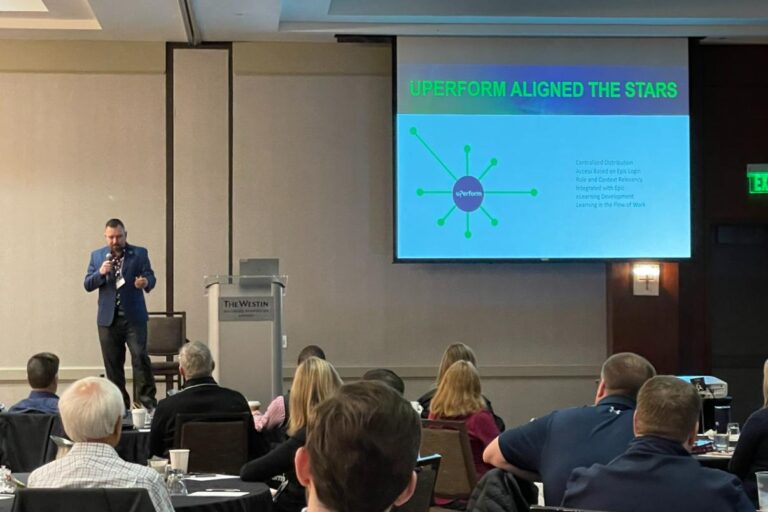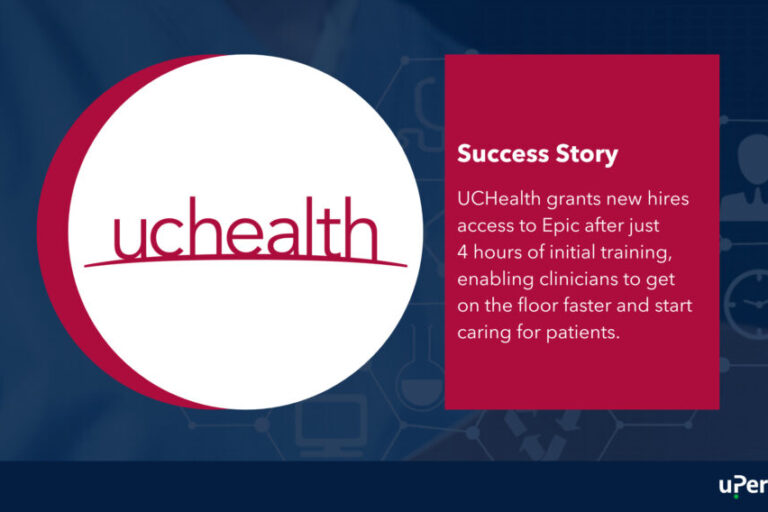The Electronic Health Record (EHR) and the digitalization of healthcare has drastically transformed the daily role of physicians, resulting in great benefits but also frustration. Tune into this podcast, hosted and moderated by Millennium Live, as Dr. David Butler, CEO at Calyx Partners, LLC, and Bobby Zarr, Vice President of Healthcare Strategy at uPerform, discuss the benefits and challenges of an increasingly digitalized healthcare landscape and offer strategies to improve the relationship between physicians and the technology they use daily.
How to better leverage the EHR and other technology tools
In this podcast episode, Dr. Butler references the ‘digital black bag,’ his allusion to the classic black bag sported by physicians of a pre-digital age. This digital black bag refers to the suite of technology tools, most notably the EHR, that physicians use daily. While these technological tools have the potential to improve quality of care, they often lead to frustration and obstacles for physicians. Dr. Butler credits this as a failure to both deliver adequate training and effectively promote the value of these tools to physicians.
As a solution, Dr. Butler proposes that when changes or new technological tools are introduced, there must be a greater focus on the need to communicate why changes are made and what value it brings to physicians (i.e., “why should I care?”). He notes that deploying changes is the easy part, but preparing and informing users of change continues to be the challenge facing many healthcare organizations.
Dr. Butler offers three strategies for health systems to guide their training and communication strategy:
Budget for optimization, not just for go-lives – Implementing new enterprise software, such as an EHR, is a big investment, and many organizations will try to save money wherever they can. However, Dr. Butler notes that it is essential for health systems to also budget for training and optimization. This will ensure users can use the software proficiently and helps the health system maximize its investment.
Pull physicians offline. Train them the right way. – With so many hospitals facing critical staffing challenges, the thought of pulling physicians offline to deliver EHR training might feel impossible. However, taking just a little bit of time to properly train physicians on how to perform essential tasks in the EHR could save them significant time in their day-to-day, increasing their efficiency and allowing them to see more patients.
Stop ‘communicating’ and start ‘marketing’ changes and upgrades – Care providers are overburdened. Simply communicating changes isn’t enough to demand their attention. Organizations must do a better job of marketing the value new changes and upgrades can offer to care givers. Does a new workflow process save them time? Or help them deliver better patient care? Communicating this value will help capture the attention of busy care givers and encourage them to engage with new change communications.
A digital healthcare landscape: what lies ahead
Dr. Butler and Zarr both agree that technology will continue to play a greater role in the daily life of the physician in the future by noting the following trends:
- Staffing Shortages: Staffing shortages are one of the biggest challenges facing hospitals, forcing them to do more with less. Staff may be required to wear multiple hats, and “perform at the top of their license” as noted by Dr. Butler. As a result, hospitals will need to have a strategy for onboarding and cross-training folks quickly. When faced with the challenges of COVID-19, Baylor Scott & White Health leveraged uPerform to create and deliver 31 cross-training courses to their clinical staff, granting the appropriate Epic security access to clinicians within 30 minutes of course completion.
- Hospital-at-Home Care: COVID-19 forced the adoption of hospital-at-home care, but at-home and virtual care options are continuing to gain traction post-pandemic. The combination of in-person visits, virtual visits and continuous biometric monitoring via telehealth technologies will require additional training and access to training while on the go. Health systems must be equipped to support a workforce to deliver exceptional patient care wherever they are, and regardless of the technology required to deliver that care.
- Continuous Innovation: New technologies, such as AI tools as noted by Dr. Butler, are being introduced at a rapid pace. While these tools have great potential to aid physicians in their daily roles, much like the EHR, they also run the risk of introducing more frustration. With so much emphasis on virtual tools and technology, it only makes sense for training to be delivered virtually as well. Zarr notes that this virtual training must be available anytime, anywhere in a just-in-time format.
Tune into the full episode and hear firsthand from Dr. Butler and Bobby Zarr how health systems can implement just-in-time training for their digital tools and better prepare for an increasingly virtual healthcare future.
Just-in-time training with uPerform
uPerform is a just-in-time learning and support platform that enables health systems to create, manage and deliver support content directly in the flow of work. Health systems leveraging uPerform have increased user engagement with software tools, improved EHR satisfaction and saved clinicians valuable time that was previously spent in classroom training.
About David Butler, MD:
David K Butler, MD, is an industry expert and respected thought leader in Electronic Health Record (EHR) implementation, stabilization, and ongoing optimization. With over 20 years of experience as an internist and pediatrician, physician executive, and consultant, Dr. Butler has advised organizations on clinical and IT governance, identification of high-value optimization opportunities, and realization of value from EHR implementation. He is committed to fixing U.S. healthcare by guiding organizations through the rapidly changing landscape of digitizing healthcare delivery.
He is currently CEO at Calyx Partners, LLC, a digital healthcare consultancy specializing in strategic advising, physician technology adoption, and workflow optimization within healthcare delivery systems leveraging Epic Systems’ clinical and financial suite of software applications. His national awards include Epic Systems’ “Physician of the Year”, “Interoperability Hero” by DirectTrust, and “Fellow of the American Medical Informatics Association (FAMIA).
About Bobby Zarr:
Bobby spearheads the healthcare management team at uPerform, helping health systems change the way software training is conducted with digital learning solutions. He is responsible for implementing strategies for health system onboarding, retention, and growth. He is a seasoned healthcare leader who brings over 10 years of extensive health IT training experience to the uPerform team.
Prior to uPerform, Bobby helped pioneer uPerform in the healthcare market at Infirmary Health. As the Manager of IT Training and Support, Bobby built and led the health system’s training program executing initiatives and optimization strategies, including the rollout and utilization of Epic to 10,000 users.
Bobby is a Certified Professional in Healthcare Information and Management (CPHIMS) and is a veteran of the United States Army.










